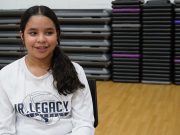Howard University senior Alyssa Mark is from Orlando. She loved middle school, but then attended three high schools and felt out of place in all of them.
“I came [up] on the side of town where it was very diverse,” she said. “A lot of cultural diversity. I never really had to worry about fitting in. I felt relatively accepted for who I was.”
By the time high school rolled around, it was a completely different story.
“When I brought that energy over to another side of town, which is definitely more like white populated, this Black girl just being like, you know, themselves, exuberant energy and dressing the way they want to dress.” she said in a pained voice. “There was not very much warmth and acceptance. It wasn’t a place crafted for me, you know? So how could you find your place when it was never meant for you?”
Historically Black colleges were often talked down..
“If you would have told me up until like my senior year of high school that I was going to be [at] an HBCU, I wouldn’t have believed you,” she said.
When submitting college applications, she realized it was time for a change of environment. Mark says the police killing of George Floyd in 2020 was a catalyst.
“I was like, ‘Yeah, no, I need to be with my people,’” she says.
Almost four years later, Mark is set to graduate from the nation’s top historically Black university.
As a queer person of color, Mark was devastated at the approval of Florida’s so-called “Don’t Say Gay” legislation.
“Florida is doing the youth a disservice by not providing a curriculum that could be beneficial for queer students and invaliding their experiences,” she said. “I realized this fully by finally having access to queer education at Howard.”
Mark says that she has found a sense of belonging in Washington, D.C.
“You just kind of feel more of the Black pride here,” she says. “Not even just being in Howard, but just the D.C. area as well. And there’s a very diverse queer community.”
She hopes to use her voice to inspire anyone who feels the way she once felt and has a message to share: “Black people are not a monolith. Don’t forget who you are and don’t be ashamed of who you are.”
































